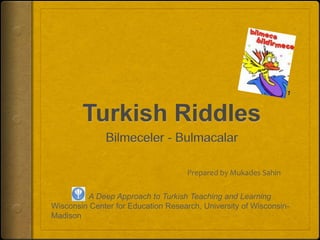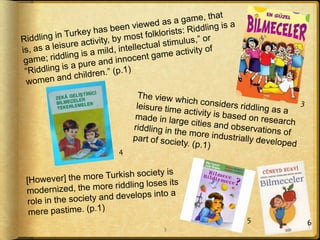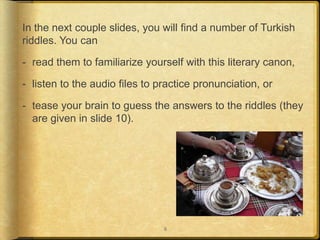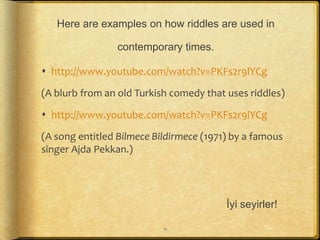Riddles
- 1. Prepared by Mukades Sahin A Deep Approach to Turkish Teaching and Learning Wisconsin Center for Education Research, University of Wisconsin- Madison
- 2. Riddle 2 Cevap: bal 2
- 3. . 5 6 3
- 4. . 4
- 5. 7 9 8 10 5
- 6. . 6
- 7. Riddling was an important part of social life in Istanbul as late as 20th . century. In coffee houses in Istanbul, men competed against each other in their riddle telling abilities in front of a sizeable audience. 11 They were judged by their speed, effectiveness, and courage. These contests would take place during the month of Ramadan, and last until the time of early morning meal of Ramadan, a.k.a. sahur. 7
- 8. In the next couple slides, you will find a number of Turkish . riddles. You can - read them to familiarize yourself with this literary canon, - listen to the audio files to practice pronunciation, or - tease your brain to guess the answers to the riddles (they are given in slide 10). 8
- 9. . DudaÄa deÄer ucu Ne getirdin a bacÄą Kuruyan aÄÄązlarÄąn Hepsi sana duacÄą YarÄąm kaÅÄąk Duvara yapÄąÅÄąk 9
- 10. . (bardak) 10
- 11. Here are examples on how riddles are used in contemporary times. ïģ http://www.youtube.com/watch?v=PKFs2r9lYCg (A blurb from an old Turkish comedy that uses riddles) ïģ http://www.youtube.com/watch?v=PKFs2r9lYCg (A song entitled Bilmece Bildirmece (1971) by a famous singer Ajda Pekkan.) Ä°yi seyirler! 11
- 12. NumaralarÄąna gÃķre fotograflar: References 1. YÄąlmaz, Fevziye. Bilmece Bildirmece . Ä°stanbul: TimaÅ YayÄąnlarÄą, 2005. 2. Edebiyat Defteri. February 15th, 2012 <http://www.edebiyatdefteri.com/yazioku.asp?id=45769>. 3. En GÞzel Bilmeceler. Ä°stanbul: 2011. 4. Zeka GeliÅtirici Bilmeceler Tekerlemeler. ÃnlÞ YayÄąnevi. 5. SÞmer, Mehmet Kadri. Bilmece Bildirmece. Ankara: ÃnlÞ YayÄąnevi, 2007. 6. Suavi, CÞneyt. KÞçÞk YaÅtaki Adamlara BÞyÞk Boyda Bilmeceler. Ä°stanbul: Zafer YayÄąnlarÄą, 2000. 7. Oldfield, A. C. and Tochon, F. V. (2011). TÞrkçe ve Azeri Arasinda KÃķprÞler Kurmak / Bridging Turkish with Azerbaijani: Music and Musicians - Azeri Folklore in the 20th Century. Module 13 Advanced Level. Madison, WI: Wisconsin Center for Education Research (WCER). http://deepapproach.wceruw.org/index.html (February 15th, 2012). 8, 9, 10. Tunç, Y. and Tochon, F.V. (2010). Turkish Cuisine and Culture / TÞrk MutfaÄi ve Mutfak KÞltÞrÞ. Module 5, Intermediate level. Madison, WI: Wisconsin Center for Education Research (WCER).http://deepapproach.wceruw.org/index.html (February 15th, 2012). 11. February 14th, <2012 http://www.parkdo.com/default.asp?id=71>. ïģ Information about Turkish riddles retrieved from the following source BaÅgÃķz, Ä°lhan. "Functions of Turkish Riddles." Journal of the Folklore Institute Vol. 2, No. 2 (Jun., 1965), pp. 132-147 06 1965. February 14th, 2012 <http://www.jstor.org/stable/3813831>. 12











